If you’re applying for an Afghan passport, you know how challenging it can be to prove your identity and match your name across different documents. Even a minor discrepancy could delay or jeopardize your application. Vieira Braga Advogados specializes in untangling these issues, guiding you step-by-step through stringent international requirements. Want to boost your chances of a smooth process? Understanding the crucial legal support available might just be your game-changer.
Understanding the Challenges of Afghan Documentation
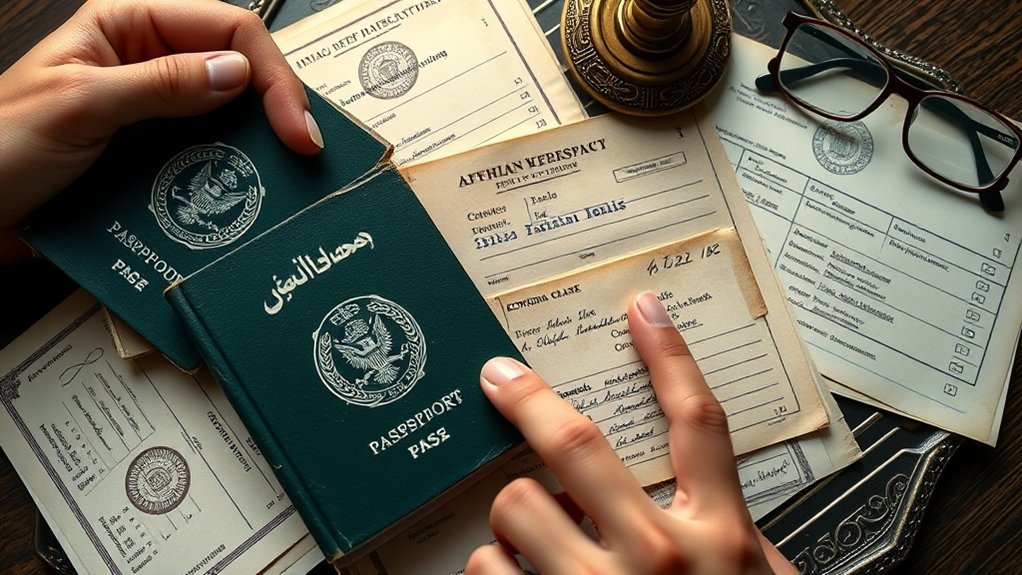
Although Afghanistan has a long history, you’ll quickly notice that its documentation system faces significant challenges. When you try to obtain or verify Afghan identification documents, you’ll often run into issues caused by inconsistent record-keeping and varying standards. There’s no centralized system to ensure names, dates of birth, or other details are recorded the same way every time. Instead, you’ll see handwritten entries or local variations, depending on the place and the official in charge.
This lack of standardization makes it difficult when you’re applying for a passport or trying to match documents for immigration or administrative purposes. Sometimes, your official documents—such as taskeras (national ID cards), birth certificates, or school records—might hold slightly different information, creating confusion. You need to be prepared to explain or verify even the smallest discrepancies in your records. In such an environment, understanding these challenges is crucial before you move forward. Seeking assistance from professionals with expertise in complex immigration regulations can help you navigate and resolve these documentation issues.
Common Reasons for Name Discrepancies in Afghan Passports
When you look at Afghan passports, you’ll often spot name discrepancies that stem from several persistent issues. First, inconsistent transliteration between Dari, Pashto, and English creates confusion, especially when no standardized spelling exists. You might find your family name spelled differently on various documents, even if the information is accurate. Second, variations arise when officials record your name phonetically, especially if you or your parents have regional dialects or unique pronunciations.
Clerical errors also occur frequently in Afghanistan, where official forms are often filled out by hand. These mistakes, such as reversing first and last names or omitting middle names, can remain uncorrected for years. Additionally, you may encounter discrepancies due to name changes after marriage, cultural customs, or tribal affiliations. All these factors make name-matching during identity verification especially challenging if you hold an Afghan passport or assist someone who does. Seeking specialized legal support can help you avoid errors during identity verification and provide guidance for document consistency during the immigration process.
International Requirements for Identity Verification
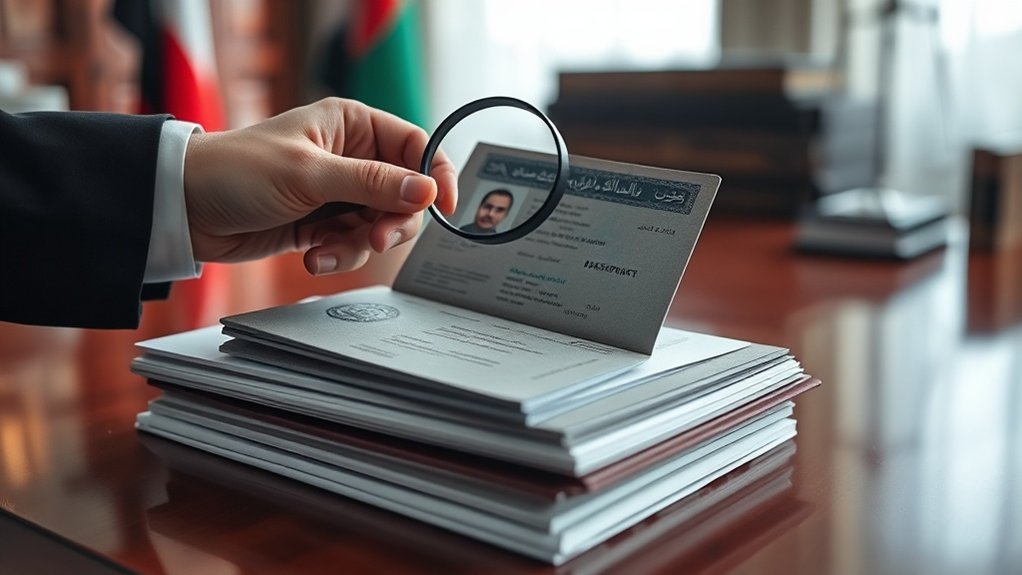
When you apply for or use an Afghan passport abroad, you’ll face strict international standards for identity verification. Countries expect your name to match exactly across all documents, and they check the authenticity of each one through established protocols. Understanding these requirements helps you avoid delays and complications at borders. For instance, many immigration systems place significant emphasis on the documentation for U.S. immigration when verifying identities and names to ensure compliance with entry and residency regulations.
Global Standards for Passports
To maintain the integrity of international travel, countries follow strict global standards for passport issuance, especially in verifying an applicant’s identity. You’ll notice that these standards are largely shaped by guidelines set by organizations like the International Civil Aviation Organization (ICAO). They require that passports meet precise specifications for biometric data, machine-readable zones, and security features to prevent fraud. When applying for an Afghan passport, you must provide original documents, including a government-issued ID, proof of citizenship, and high-quality photographs that meet ICAO criteria. Authorities will check these against national and international databases to confirm your identity. By aligning with global standards, Afghan passports remain valid and trusted worldwide, helping you travel safely and securely without facing unnecessary scrutiny at international borders. Many countries use similar approaches to identity verification for other major immigration processes, such as employment-based visas, to ensure applicants meet eligibility requirements and maintain secure immigration systems.
Cross-Border Name Consistency
Although passport authorities adhere to rigorous standards, even minor inconsistencies in your name across different documents can complicate identity verification during international travel. Name spelling, order, or formatting errors—no matter how small—may trigger enhanced scrutiny at border controls, disrupt visa processing, or affect entry into foreign countries. Countries expect your passport, visa applications, and supporting identity documentation to display your name consistently, following international transliteration rules and local naming customs.
If you have variations—such as different surname orders, inconsistent use of diacritics, or alternate spellings—you might face challenges at airports or embassies. To minimize issues, always ensure that your official Afghan passport matches the information on your supporting documents. Proactively check for transliteration consistency when your name is rendered into other alphabets, especially English or Latin script.
Consulting with an immigration lawyer can help you avoid problems caused by name inconsistencies and ensure your documentation meets international requirements.
Document Authentication Protocols
Every country imposes its own document authentication protocols to verify your identity during the passport application and international travel process. If you’re applying for or using an Afghan passport, you’ll need to provide original documents like your tazkira (Afghan national ID), birth certificate, or court-issued records. You might also encounter requirements such as certified translations, notarized copies, or apostilles, especially when your documents cross borders.
You shouldn’t assume that one country’s verification method will satisfy another nation’s authorities. Some governments demand in-person interviews, biometric data, or additional scrutiny of supporting documents. To ensure acceptance, review the destination country’s requirements carefully and prepare your documents as specified. Following these strict international protocols reduces the risk of delays, refusals, or accusations of identity fraud during your travel or resettlement process.
To further reduce risk and ensure proper compliance, professional support ensures legal security at every stage of your identity verification and immigration journey.
The Role of Legal Assistance in Name-Matching Processes
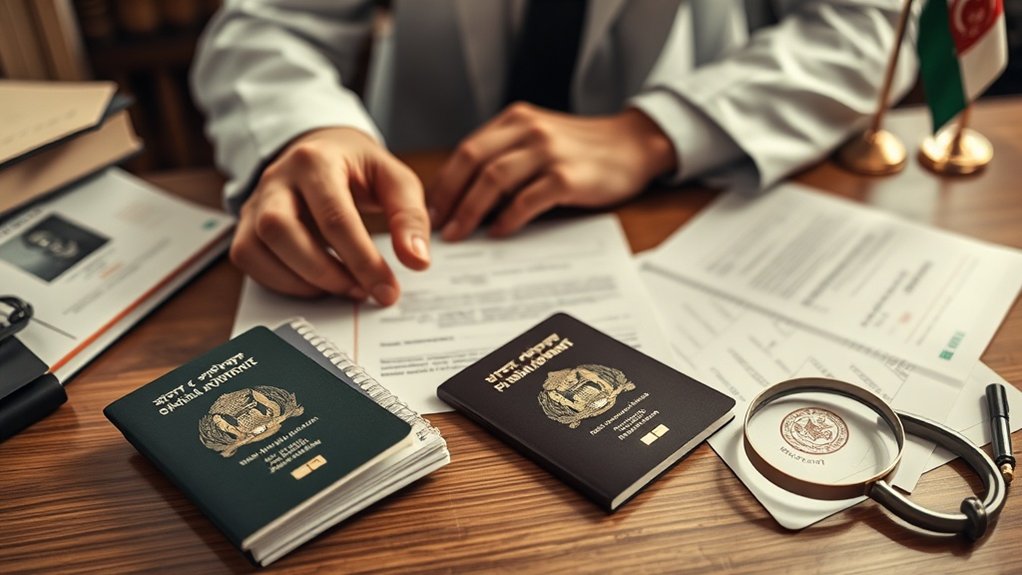
When navigating the name-matching process for Afghan passport applications, legal assistance plays a crucial role in ensuring accuracy and compliance with official requirements. You’re likely to face inconsistencies due to differences in spelling, transliteration, or documentation across various jurisdictions. Engaging a legal expert means you’ve got someone by your side who understands both Afghan and international legal frameworks.
A lawyer’s expertise can help you:
- Identify and interpret discrepancies between various official documents.
- Prepare the correct legal documents and affidavits for clarification.
- Communicate directly with passport authorities to defend your name-matching rationale.
- Prevent delays or rejections by proactively addressing foreseeable issues.
Legal advisors ensure your case is well-documented and convincingly presented, giving you the best chance of a smooth application process. Their familiarity with local and international regulations can make the difference between approval and frustrating setbacks, ultimately supporting your right to accurate identity documents. In many cases, professional support from an immigration lawyer also helps minimize processing delays and enhances your overall chances of success.
Steps in Resolving Identity and Name Inconsistencies
Before you can secure an Afghan passport, you’ll need to address any inconsistencies in your identity and name across official documents. Start by carefully reviewing all your paperwork—birth certificates, national IDs, marriage records, and any past passports—to pinpoint discrepancies in spelling, dates, or formatting. Make a list of differences so you know exactly what needs correction.
Next, gather any supporting documents that can help clarify your identity. This might include family records, school certificates, or community attestations. Submitting a written statement explaining the inconsistencies can be helpful, especially if the differences are due to translation or transcription errors.
You’ll also need to visit the relevant government offices to correct errors, update records, or request official verification letters. Work closely with your legal advisor so documents are consistent and complete, which simplifies the application process. Taking a proactive, organized approach gives you the best chance of resolving identity and name mismatches efficiently. Seeking personalized case analysis from an immigration lawyer can further prevent errors and delays in the resolution process.
Case Studies: Successful Outcomes for Afghan Clients
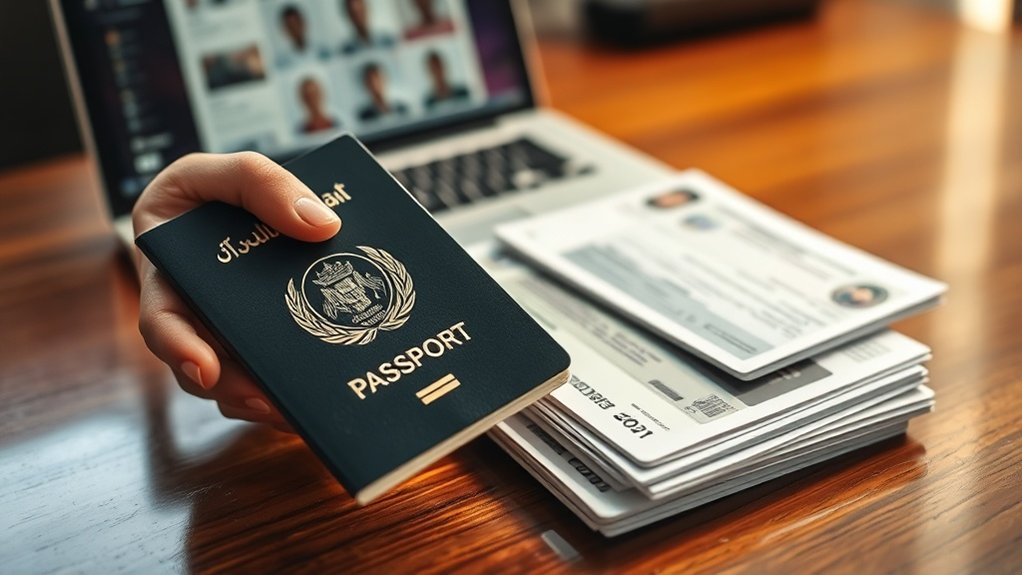
Now, you’ll see how other Afghan clients have successfully handled name discrepancies and tricky document checks. You can learn from real examples where clear strategies and strong embassy communication made a real difference. These case studies will give you practical insights for your own journey. Additionally, understanding the importance of essential documentation knowledge can play a key role in ensuring your family immigration process goes smoothly.
Overcoming Name Discrepancies
Despite the challenges posed by inconsistent spellings or missing components in legal documents, many Afghan clients have successfully resolved name discrepancies during the Afghan passport application process. When you face mismatched names in your records, you’re not alone—others have overcome similar issues. By reviewing real cases, you can see which approaches work best. Typically, successful resolutions have involved the following steps:
- Collecting alternative identification or evidence to support the correct name.
- Providing sworn statements or affidavits that explain the inconsistency in detail.
- Using official translations to ensure names match across languages and scripts.
- Involving community leaders or recognized figures to validate your identity.
In many cases, having legal guidance from an experienced immigration lawyer like Vieira Braga Advogados minimizes risks and significantly increases your chance of achieving a successful outcome with Afghan passport or visa applications.
Document Verification Strategies
Resolving name discrepancies often hinges on how effectively you can verify your documents. When working with Afghan passports, you need to present clear, authenticated proof that ties your identity across all records. Start by assembling civil status documents, prior passports, and any official paperwork that shows consistent information. Vieira Braga Advogados has seen clients succeed by cross-referencing birth certificates and tazkiras with their passport applications. In many cases, clients have also used certified translations to clarify script differences or minor spelling variations. Keep every page officially stamped and, if possible, notarially attested. Don’t overlook school records or employment certificates—they often provide extra evidence of your identity. By organizing these documents carefully, you make your case stronger and help avoid complications during verification.
Embassy Communication Success
When Afghan clients approach embassies with well-prepared documents and clear communication, they’ve often achieved positive identification outcomes. Embassies appreciate clients who can clearly articulate their situation and present supporting materials in an organized manner. Your interactions with embassy staff matter—being respectful, concise, and responsive can mean the difference between delays and speedy success. Case studies handled by Vieira Braga Advogados show that effective embassy communication helped many clients navigate complex identity or name-matching issues for Afghan passports. For the best results, make sure you:
- Submit translated and notarized documents, highlighting exact name spellings.
- Clarify discrepancies using cover letters or affidavits as needed.
- Keep all correspondence and document copies organized and accessible.
- Respond promptly to embassy requests for additional information.
Essential Documentation Needed for Proof of Identity
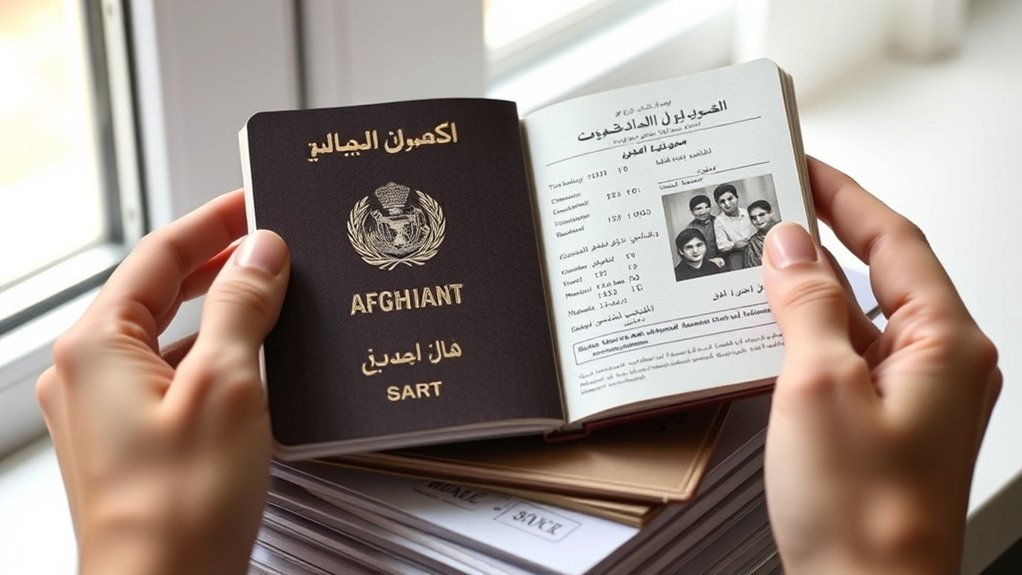
To successfully apply for an Afghan passport, you’ll need to gather several essential documents that establish your identity. First, you must provide a valid tazkira, which is Afghanistan’s national identification document. If your tazkira isn’t available or has discrepancies, a certified copy or an official record from Afghan authorities can sometimes substitute. You’ll also need a recent passport-sized photo that meets the embassy’s requirements. Make sure it’s clear, in color, and neutral in background.
In addition, bring any previous Afghan passports, if applicable, as these help confirm your identity and assist in the application process. Birth certificates, national ID cards from other countries, or residency permits may also support your case, especially if your documents have spelling variations or errors. Remember to ensure that names and dates of birth match across your paperwork to avoid complications. Careful preparation prevents unnecessary delays and ensures a smoother application process.
How Vieira Braga Advogados Supports Afghan Passport Holders
Once you’ve gathered your documents, professional support can make the next steps much more manageable. Vieira Braga Advogados specializes in helping Afghan passport holders like you address complex proof of identity requirements. Their team knows how to handle issues such as name variations, transliteration challenges, and document authenticity that often arise for Afghans abroad. When you work with them, you’ll benefit from focused guidance throughout the process.
Here’s how Vieira Braga Advogados supports you:
- Document Review: They meticulously review your paperwork to spot errors or inconsistencies.
- Legal Representation: If needed, they advocate for your case before relevant authorities.
- Name-Matching Solutions: They suggest effective ways to address and explain name discrepancies.
- Process Guidance: They keep you updated and informed at every stage, ensuring you’re never left guessing.
Their tailored approach helps you overcome obstacles, improving your chances of a successful Afghan passport application.
Frequently Asked Questions
The Directorate of Passports under Afghanistan’s Ministry of Interior Affairs is responsible for issuing, renewing, and managing Afghan passports.
Can I travel with my Afghan passport?
Yes, if the passport is valid and recognized by the destination country, though entry may require visas or additional documentation depending on the country’s regulations.
How Long Does the Name-Matching Process Usually Take?
The name-matching process usually takes anywhere from a few days to a couple of weeks, depending on the accuracy of your documents and the responsiveness of the authorities involved. You’ll speed things up if you provide complete and clear paperwork from the start. Delays can happen if there’s any inconsistency in your records, so double-check everything beforehand. If you need things done faster, don’t hesitate to ask about expedited processing options.
Are There Additional Fees for Expedited Services?
Yes, you’ll usually have to pay additional fees if you want expedited services. When you request a faster processing time, agencies often charge extra to prioritize your application. It’s important to check the specific fee details in advance, so you’re not surprised by the added cost. Make sure you understand what the expedited service covers and how quickly you can expect results before making the payment, so you’re fully prepared.
Can Children’s Name Issues Be Resolved Similarly?
Yes, you can resolve children’s name issues in a similar way as adults. You’ll need to collect the child’s documents, provide evidence of the name discrepancy, and follow the appropriate procedures for correction. It’s important you act promptly, as schools and consulates may also require consistent documentation. If you’re unsure about any part of the process, you should consult with professionals to ensure all requirements are correctly met for your child’s application.
What Happens if My Passport Is Expired?
If your passport is expired, you can’t use it for international travel or as valid identification. You’ll need to renew it before making any travel plans. Visit the relevant government office or embassy, submit a renewal application, provide your expired passport, recent photos, and supporting documents. Check the specific requirements for your nationality. Processing times vary, so apply early to avoid delays. Don’t wait until the last minute to renew your passport.
Is Remote Legal Assistance Available for Clients Outside Brazil?
Yes, you can access remote legal assistance even if you’re outside Brazil. Many law firms now offer virtual consultations through email, phone, or video calls, making it easier for you to discuss your case no matter where you are. You’ll simply need to schedule an appointment and be ready with your documents. Don’t let distance stop you—professional legal support is just a call or message away, tailored to your needs.
Conclusion
When you’re applying for an Afghan passport, name discrepancies and proof of identity can quickly become overwhelming. With Vieira Braga Advogados by your side, you don’t have to navigate these challenges alone. Their team guides you through each step—clarifying documents, handling translations, and ensuring international compliance. By addressing inconsistencies early, they boost your chance of a successful application. Trust their expertise to simplify the process and secure your identity documentation with confidence and peace of mind.
